Key takeaways:
- Code reviews serve as both a quality control mechanism and a mentorship opportunity, promoting shared learning among developers.
- They enhance teamwork and accountability, fostering a culture where constructive feedback drives continuous improvement.
- Common pitfalls include focusing on trivial details, hesitance to provide honest feedback, and over-reliance on a single reviewer, which can stifle innovation.
- Preparation and clarity in communication are essential for productive reviews, ensuring that feedback is both constructive and beneficial for team growth.
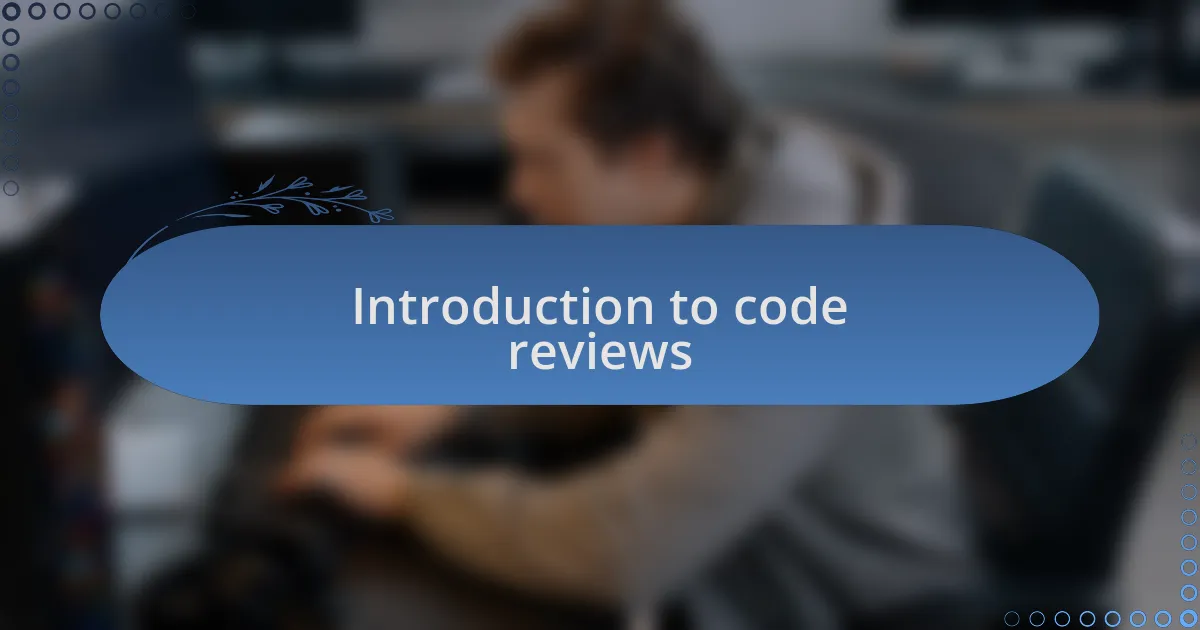
Introduction to code reviews
Code reviews are a crucial aspect of the software development process, functioning not just as a quality control checkpoint, but as a collaborative tool that fosters learning and improvement. I still remember my first experience with a code review; it felt a bit intimidating at first, yet it turned out to be a goldmine of insights. Have you ever received feedback on your work that opened your eyes to a new way of thinking? That was my experience, and it reshaped my approach to coding.
As I delved deeper into code reviews, I realized they also serve as an opportunity for mentorship. It’s fascinating how seasoned developers can provide guidance that helps me avoid potential pitfalls, enhancing my skills over time. There’s always a comfort in knowing that someone has my back, and in return, I get to contribute my perspective as well. How often do we get the chance to share knowledge in a structured way like this?
Moreover, engaging in code reviews invokes a sense of teamwork that resonates with me. It’s not just about fixing bugs or improving code; it’s about building a shared understanding and creating a culture of continuous improvement. I often find myself questioning how I can better articulate my thoughts during these sessions. The answer? Practice and openness are key.
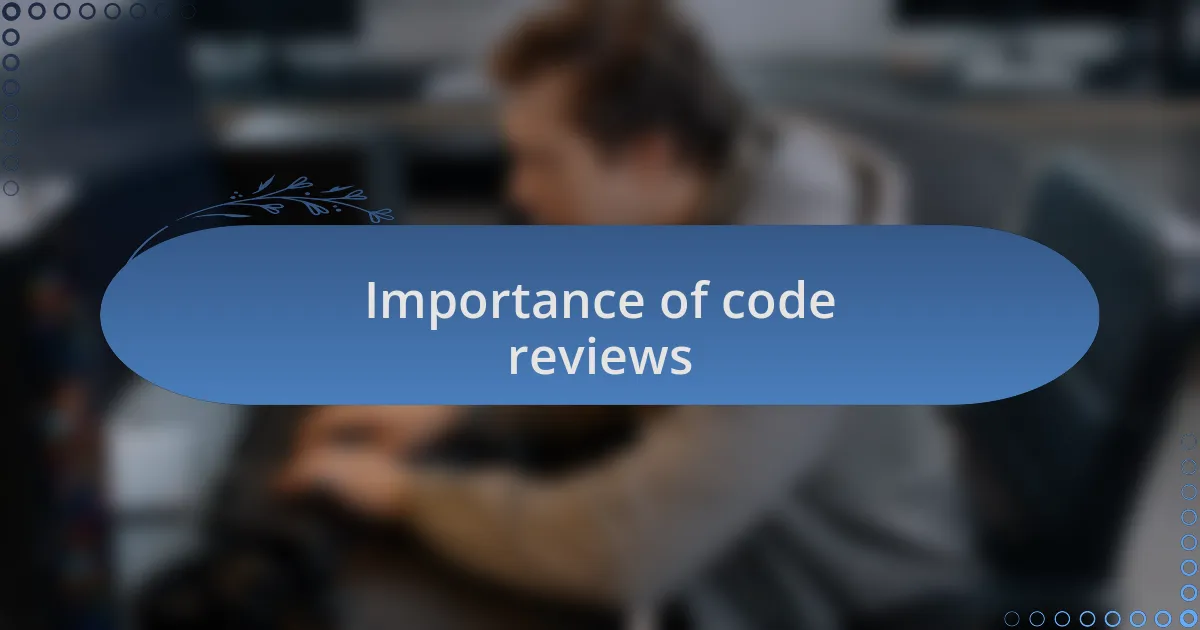
Importance of code reviews
When I think about the importance of code reviews, I can’t help but appreciate how they elevate the quality of our work. It’s not just about finding errors; it’s about cultivating a culture where every line of code can spark discussion and encourage innovation. Have you ever worked on a project where a single suggestion transformed your approach? In one of my projects, a colleague pointed out a more efficient algorithm that not only saved time but also improved performance significantly. That experience reinforced my belief that every review can be a learning opportunity.
Code reviews also enhance teamwork and ownership within a development team. I vividly recall a review session where we collectively tackled a complex problem, and it brought us closer together as a group. The input from different perspectives led to richer solutions that I would never have reached on my own. Has there been a time when collaboration led you to a breakthrough? I believe those moments strengthen the bonds among teammates and drive collective success.
Lastly, I find that code reviews help reduce the likelihood of technical debt accumulating over time. When we address issues early on, we’re investing in the long-term health of our codebase. I remember a project where we implemented regular reviews, and it resulted in cleaner, more maintainable code. Doesn’t it feel better to return to well-structured code rather than sift through a mess? By prioritizing reviews, we’re not just fixing problems; we’re nurturing a sustainable development environment.
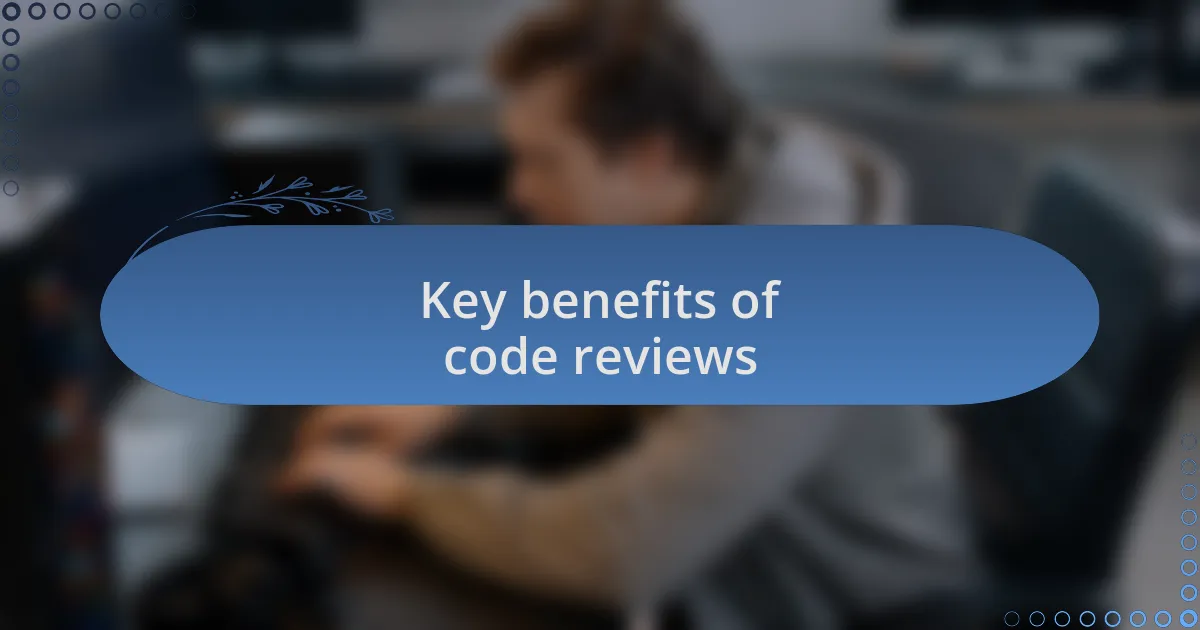
Key benefits of code reviews
The key benefits of code reviews go beyond just spotting syntax errors; they play a crucial role in knowledge sharing among team members. I recall a time when a more experienced developer brought an entirely new testing strategy to light during reviews. This not only educated those of us less familiar with the approach but also improved the overall robustness of our applications. Have you ever had your understanding deepened by someone else’s perspective? Those enlightening moments in code reviews can significantly bolster the collective skill set of a team.
Another notable advantage of code reviews lies in fostering a sense of accountability. When I submit my code for review, I feel a heightened responsibility to ensure quality. This peer oversight encourages me to think critically about my decisions and write more maintainable code. Isn’t it interesting how the feedback process itself motivates us to strive for higher standards? Knowing that my colleagues are engaged in the quality of our work pushes me to deliver my best effort.
Moreover, regular code reviews often lead to faster onboarding for new team members. I remember welcoming a junior developer last year; through our review process, they got up to speed quickly, absorbing best practices and the team’s coding philosophy. How rewarding is it to see someone grow and contribute positively so swiftly? Creating this platform for interaction not only accelerates their learning curve but also strengthens our project’s foundation with fresh ideas.
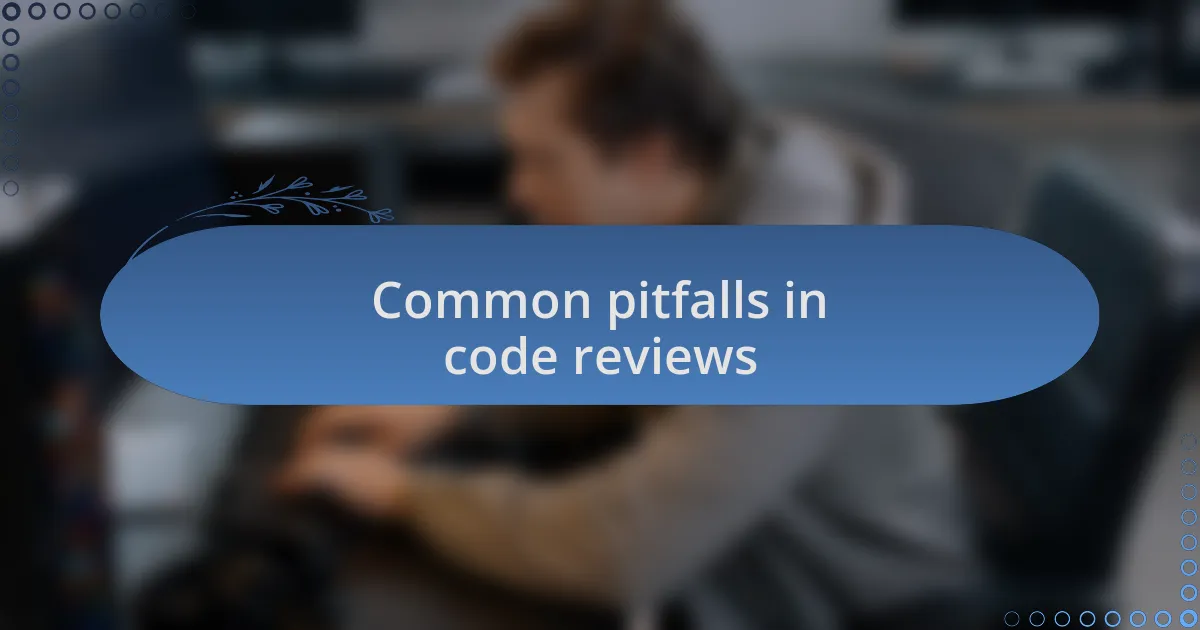
Common pitfalls in code reviews
In my experience, one of the most common pitfalls in code reviews is focusing too heavily on minor details, like spacing or comment styles, rather than the overall functionality. I remember a review session that spiraled into a debate over whether to use single or double quotes. It felt trivial at the time, but I realized later that energy could have been better spent discussing more critical aspects, such as optimization and readability. Isn’t it fascinating how easily we can lose sight of the bigger picture?
Another issue I’ve observed is when reviewers feel intimidated and fail to provide honest feedback. There have been instances where I hesitated to call out problematic code because I didn’t want to hurt someone’s feelings. However, I came to understand that constructive criticism is essential for growth. If we shy away from offering genuine insights, aren’t we doing a disservice not only to the code but also to our team’s development?
Lastly, I’ve seen teams fall into the trap of relying too much on a single reviewer, which can skew perspectives and limit diversity in feedback. In one project, we had a particularly opinionated developer always taking the lead in reviews. I noticed several valid suggestions from others getting overlooked, leading to stagnation in our code quality. How can we expect innovation if we don’t encourage the entire team to contribute their insights? Balancing voices in reviews is crucial for cultivating a richer dialogue and more robust solutions.
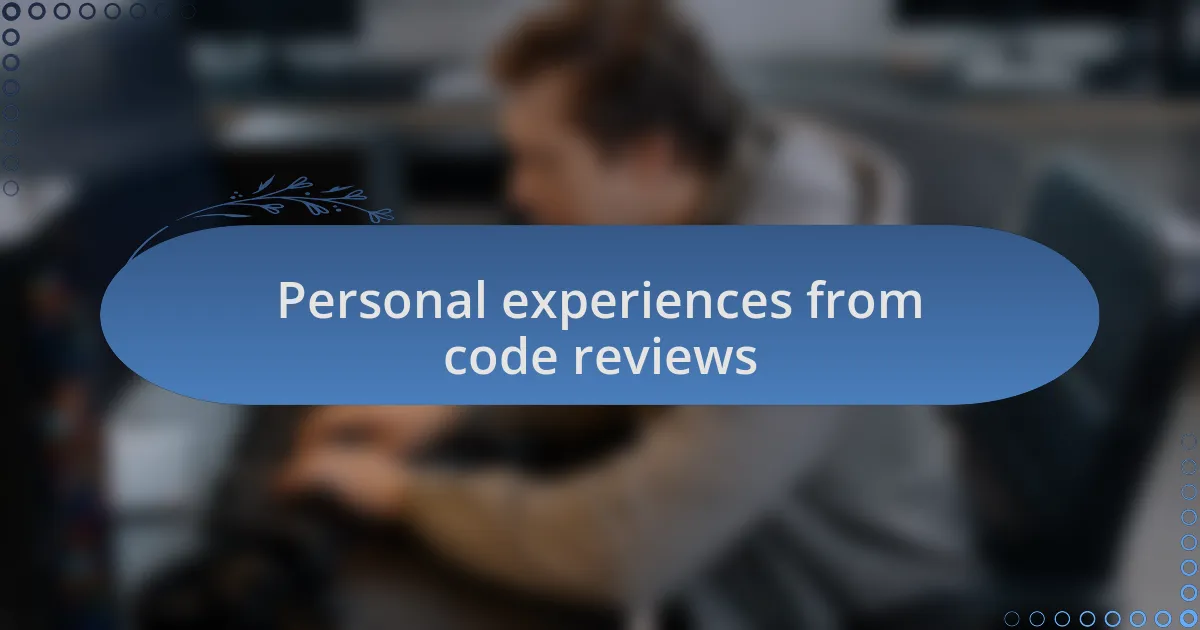
Personal experiences from code reviews
During a recent code review, I encountered a junior developer who presented a solution that, on the surface, seemed unconventional. I remember feeling hesitant at first, thinking it might complicate things. However, as we discussed it, I began to appreciate the innovative approach they brought to the table. This experience taught me the value of remaining open-minded during reviews. Isn’t it rewarding to discover fresh perspectives that we might have brushed aside?
There was another instance where I made a significant mistake while giving feedback. I focused too much on nitpicking minor issues rather than the potential of the entire project. After the review, I sensed that the developer felt discouraged, which was not my intention at all. This moment reminded me that our tone and approach matter just as much as the content of our feedback. How can we foster a constructive environment if we aren’t mindful of how our words impact others?
I’ve also learned that preparation plays a crucial role in productive code reviews. I remember walking into a session without fully digesting the code changes, only to struggle to articulate useful feedback. That experience was frustrating for both me and the developer. It underscored the importance of taking time to review and understand changes beforehand. Are we truly contributing if we’re not adequately prepared? Engaging deeply with the material enhances the quality of our discussions and ultimately benefits the whole team.

Lessons learned from code reviews
One major takeaway I’ve gleaned from code reviews is the importance of collaboration. I vividly recall a session where differing opinions arose on a coding strategy. As we debated the merits, I realized that these disagreements weren’t setbacks; they were opportunities for deeper understanding and growth. How often do we overlook the power of constructive debate? It can lead to better solutions and fosters a stronger team dynamic.
Another lesson emerged around clarity in communication. I remember giving feedback on a piece of code that was elegant but not immediately understandable. In my rush to critique, I neglected to explain why the clarity mattered. The developer left feeling confused, and I realized that I had a responsibility to communicate effectively. How can we expect others to learn if we’re not clear in our guidance? This instance taught me that transparency in feedback not only aids comprehension but also builds trust.
Additionally, I’ve come to appreciate the diversity of thought that different backgrounds bring to the table. In one review, a colleague from a completely different industry suggested a unique coding solution based on their varied experiences. Initially, I was skeptical, but I later recognized the value of that fresh perspective. I often ask myself, can we leverage our diverse backgrounds to enhance our coding practices? Embracing these different viewpoints has enriched my understanding and led to innovative solutions we might not have explored otherwise.